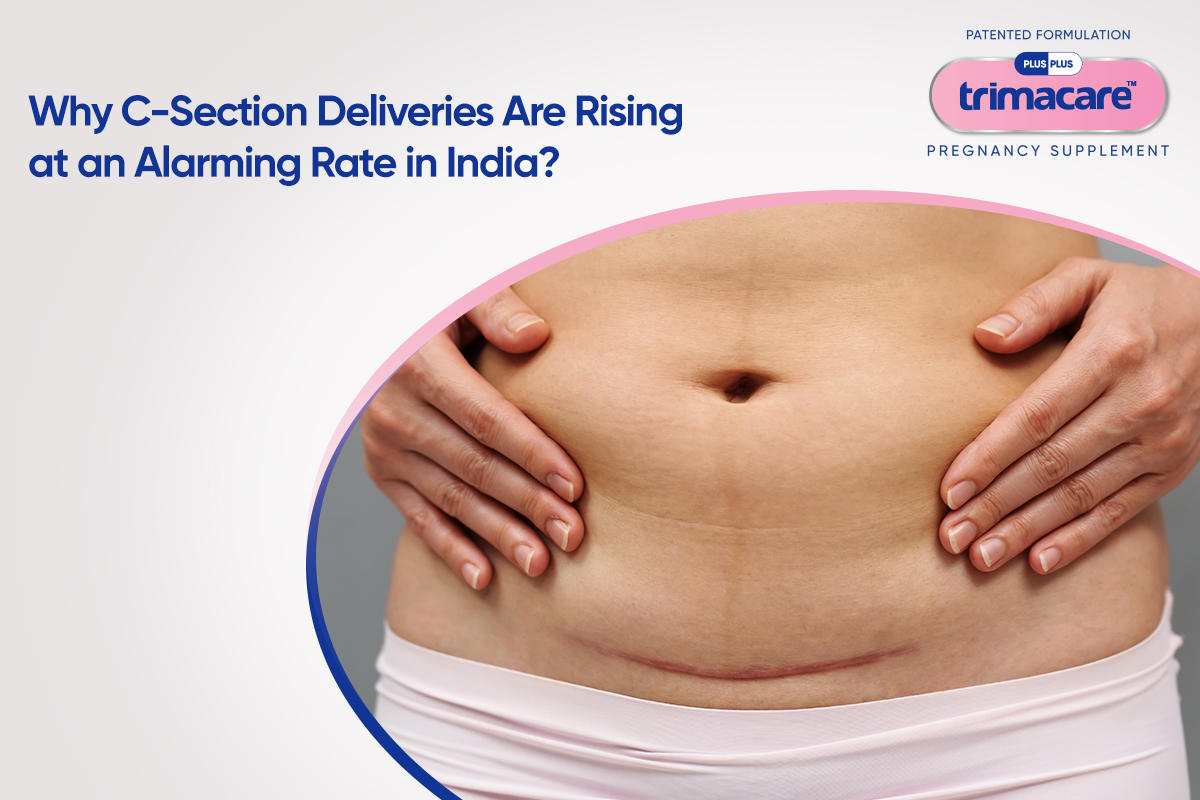
India is witnessing a huge surge in cesarean (C-section) deliveries over the past few decades. As per the Ministry of Health and Family Welfare (MoHFW), “C-section when indicated is a life-saving procedure but when performed without appropriate indications can add risk to both mother and baby.”
Another report by the National Family Health Survey (NFHS) states that India is currently witnessing the trend of C-section delivery. It was 8.5 percent during 2005-06, 17.2 percent in 2015-16, and during 2019-21 it reached a high of 21.5 percent. One aspect is better access to health care, but another aspect is overmedicalization, health risks, and an increased economic burden on families.
In this blog, we will grasp all about C-sections, their major reasons, impacts, and their solutions. Let’s jump right into it.
What is C-Section Delivery?
A C-section delivery is an operative process used for delivering the baby through incision into the mother's abdomen and uterus. However, although life-saving in most medical emergency cases, like placenta previa, fetal distress, or obstructed labor; still risks associated. The C-section recovery period takes time and the likelihood of developing complications in its result such as infection, blood clotting, and adhesion. The World Health Organization has suggested that the rate of C-sections should be between 10-15% for safety without overuse. Sadly, India has exceeded the threshold in several regions in recent decades.
Key Reasons for Sudden Hike in C-Section Delivery Cases
Healthcare Commercialization
Private hospitals often prioritize profitability and promote C-sections rather than vaginal deliveries.
Lawsuit Dread:
Various hospitals choose C-section deliveries as a defensive strategy against potential lawsuits associated with normal delivery complications.
Ease for Doctors & Families:
C-section deliveries offer convenience for both doctors and families and allow them to plan birth without experiencing labor.
Lack of Awareness:
Most pregnant women and their families don’t know about the advantages of natural childbirth and the risks of C-sections.
Medical Conditions:
The rate of diseases like obesity, gestational diabetes, and hypertension is on the rise among pregnant women. The complications arising from these conditions necessitate C-sections most of the time.
Digital Dependency:
This often results in recommendations for C-sections even when they may not be strictly necessary due to excessive use of interventions such as fetal heart monitoring and labor induction.
Effects of C-Section
Risk to Mother's Health: Women who have C-sections take longer to heal and are more susceptible to developing infections, bleeding, or any other condition.
Risk to Baby's Health: Newborn babies born through C-section may suffer from weak immunity, respiratory issues, and later obesity and allergy issues.
Financial Impact: C-sections are costlier than natural births and have a direct impact on family economies.
Psychological Effects: Mothers who have undergone C-section delivery are at higher risk of postpartum depression for longer periods.
Solutions
Creating Awareness: Instructing women about the benefits of natural delivery and the cons of C-sections is essential.
Improved Health Care Policy: The government should impose restrictions on the issues of C-section requests and rates in private hospitals.
Promote Natural Birth: Promotion of natural birth practices More effective pain relief methods; Doulas, support towards natural birth.
Government Regulation: Private hospitals require better regulation from the government. C-sections should be performed only in cases strictly required medically.
How Trimacare™ Reduces the Risk of C-Section Delivery?
Trimacare™ is the best prenatal vitamin in the Indian market which is packed with 20+ essential nutrients. It is specifically designed to support the optimal well-being of the mother and the baby during and after pregnancy. Trimacare™ is a medically formulated supplement that helps reduce the risk of C-section delivery by:
Ensures Overall Nutrition: Trimacare™ is packed with over 20 essential nutrients like folic acid, calcium, zinc, omega-3 fatty acids, etc. All these nutrients promote healthy pregnancy and prevent complications, like hypertension and gestational diabetes.
Promotes Baby’s Development: Trimacare™ includes key ingredients like DHA and Iodine that help the brain and neurological development while ensuring the baby is healthy and does not require intervention.
Prevents Birth Complications: Trimacare™ contains Vitamin D, iron, and more essential nutrients that help reduce the risk of anemia, pre-eclampsia, and preterm labor - conditions leading to C-section delivery.
Supports Normal Delivery: Featuring 20+ essential nutrients, Trimacare™ provides adequate nutrition to the body, enhances maternal strength and stamina, and boosts the chances of vaginal delivery.
The Final Verdict:
The medical, social, and health economics environment in India has enhanced the soring hike on C-section delivery. These procedures help a lot in any medical emergency.
However, their overuse in non-emergency situations will cost a lot of health both mothers and babies financially. The issue needs to be tackled collectively by policymakers, health providers, and families.
Raising awareness, boosting maternal care, and stopping unnecessary C-section delivery can help solve the issue. Moreover, you can try Trimacare prenatal supplement to increase your chances of vaginal delivery.
FAQs on the Topic:
Que: When is C-section delivery required?
Ans: Medical urgencies such as fetal distress, obstructed labor, placenta previa, maternal hypertension, or diabetes require a C-section delivery.
Que: What has led to increased C-section delivery in India?
Ans: C-section deliveries are increasing in India due to several factors like fear of lawsuits, commercialization of healthcare, lack of awareness, etc.




